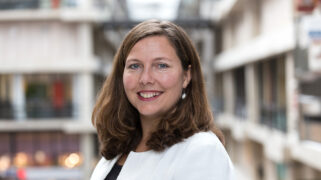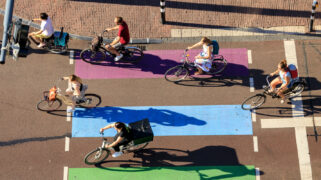The winners of Europe’s Social Innovation Competition
The commission received 1.254 ideas. On 14 May 10 finalists were selected. On the final event the three finalists received a trophy and 30.000 euro from Commissioner Michel Barnier.
- KL'ers involved
- Chris Sigaloff
On 20 May in Brussels the final event took place of the second edition of Europe’s Social Innovation Competition. The commission received 1.254 ideas. On the final event the three finalists received a trophy and 30.000 euro from Commissioner Michel Barnier.
Winners
The following outstanding ideas are the winners of the second edition of the European Social Innovation Competition (see press release):
- From waste to wow! QUID project (Italy): the initiative will recycle slightly damaged textile which cannot be used for Italian top brands into limited collections, and thereby provide jobs to disadvantaged women.
- Urban Farm Lease (Belgium): the project will facilitate and support urban farming in Brussels, with the aim of directly creating 6,000 jobs and an additional 1,500 jobs considering indirect employment.
- Voidstarter (Ireland): thanks to this scheme, the numerous units of social housing which are empty in Dublin will be refurbished by unemployed people and turned into spots for learning and entrepreneurship.
Finalists
The 10 finalists of the Competition were chosen on 14 May (see press memo). Here is a brief description of the other 7 projects:
- MC² Experience @ Work (Belgium): large companies tend to promote early retirement. At the same time many senior employees wish to stay active longer and the replacement of those experienced workers is not always easy. The Multi Company Mobility Centre is a platform enabling employees older than 50 years to stay at work with different companies, whilst keeping a contract with their original employer.
- Pan-European Food Distribution Network (Germany): Europe’s food retail market tends to be oligopolistic and to yield little compensation for farmers. This limits the viability and job potential of small-scale food production. The network plans to circumvent this situation by linking producers to consumers directly with a webshop portal and with a novel, low-cost and Europe-wide logistics system.
- Ruffboards (Austria): top-end niche markets usually offer high potential for jobs. Ruffboards intends to produce uniquely designed longboards, skateboards and snowboards by employing young former offenders. This will reduce re-offending rates by training and placing them within the industry upon their release from prison.
- Task Squad (United Kingdom): first experience often comes through small jobs. Task Squad is a mobile-responsive platform connecting young people with ‘micro-work’ adverts to be posted by small businesses, charities and start-ups – anything from half-a-day to one-week duration. The platform will support young people to seize such opportunities in a safe way, whilst helping them move on to longer-term employment.
- The Synergise Project (United Kingdom): social housing and long-term unemployed have mutual affinity for each other. The project is to bring together those who need work (the unemployed tenants) with those who need to deliver services within the community (the social housing providers). Developing this relationship has the potential to create local jobs and provide an entry into the jobs market.
- Waste-Fab-Lab (Italy): every European produces on average more than 500 kilograms of waste each year. While the recycling industry continues to grow, many waste streams are still ignored or not connected to new innovation models (e.g. open innovation, co-design or 3D-printing). The project is meant as a shortcut from waste to creation.
- YouRock! (United Kingdom): many young people fear that unemployment is their destiny and they may never find work. Yet they avoid established professional networking platforms, while employers increasingly look at them when reviewing potential employees. YouRock will fill this gap for young people with a tool to facilitate their employability by identifying their work skills hidden in everyday activities, presenting them in a dynamic profile and offering endorsements from trusted adults.
- KL'ers involved
- Chris Sigaloff cs@kl.nl




